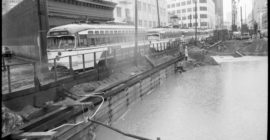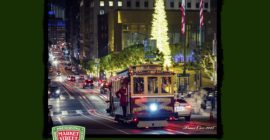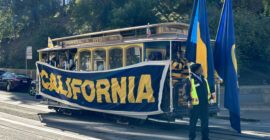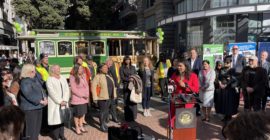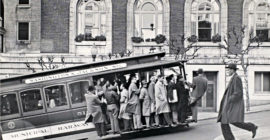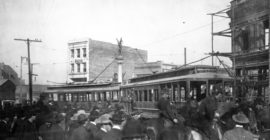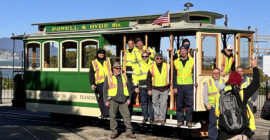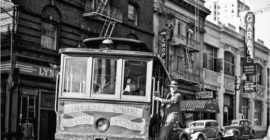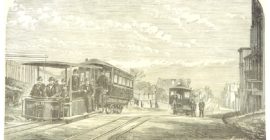Streetcars and water don’t mix well. Electric motors don’t work when they’re soaked. Water coming down from the heavens – rain – no worries. But water coming up from beneath – flooded streets – not good.
SFMSR
Formerly ‘Uncategorized’ which is a default term for Stories, and may be left checked even when a post is assigned categories. The Slug is generic & meaningless but it looks better when the public views articles.
Happy 110th Birthday, Muni
December 28, 1912. Fifty thousand San Franciscans gathered at Market and Geary Streets. Was it a presidential visit? No, it was the transit equivalent of a late visit from Santa. It was a new streetcar line.
Looking back – and forward
In 2023, we will celebrate 150 years of cable cars AND the 40th anniversary of the first Historic Trolley Festival that led to the permanent F-Market & Wharves vintage streetcar line.
CAL-ble Car
It’s Big Game week in the Bay Area. (To those reading this from elsewhere, it’s our biggest college football rivalry: University of California, Berkeley, known to all its fans as simply Cal, vs. Stanford University. ) The first Big Game was in 1892, four years after cable car service started on Powell Street, one year after cable cars started running on Hyde.
75th anniversary celebration of saving the cable cars proves a real bell-ringer
On October 26, San Francisco got a joyous reminder of just how important our cable cars are with a bell-ringing, bottle-breaking celebration of the 75th anniversary of the saving of the cable cars, in a grassroots campaign led by Friedel Klussmann, in an era when women had very little power in city political and economic life. (Here’s that fascinating story.)
1947: Cable car war
In 1947, San Francisco almost lost its Powell cable cars forever. A women-led campaign overcame male-dominated government and business interests to save them. That is a great story in itself. But there’s more to it, including lessons for today and tomorrow.
STRIKE!
San Francisco has long been in the forefront of workers’ rights. This history extends back into the 19th century, but it was an event just one year after the San Francisco earthquake and fire of 1906 that shook the city all over again – one of San Francisco’s bitterest strikes that shaped the future of streetcar service in San Francisco and influenced the City’s labor movement in general.
Great 8
Muni’s Cable Car Carpentry Shop has worked its magic many times in bringing sagging and spent cable cars back to life. Powell Car 8, which reentered service in 2022, may be its greatest accomplishment yet.
Farewell to fabulous photographer Fred Lyon
If there’s a special heaven for photographers, greats like Dorothea Lange, Henri Cartier-Bresson, Ansel Adams, O. Winston Link, and many others are welcoming San Francisco’s Fred Lyon, who captured the essence of this city in the mid-20th century in images just as brilliantly as Herb Caen captured it in words.
Happy 149th Anniversary, Cable Cars!
August 2, 1873 — In the wee small hours of a misty San Francisco night (they didn’t call the month “Fogust” back then, but it was), a new type of transit was about to be inaugurated. An endless wire rope clattered beneath Clay Street. An odd open vehicle sat on the rails at the top of the hill. Standing by was Andrew Smith Hallidie, a Scot who had experience using wire rope in the mining business, and was part of the team promoting this new technology, aimed at making horsecars obsolete.
Archive: All Posts
